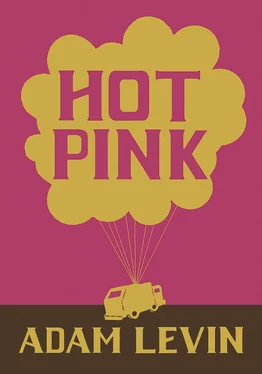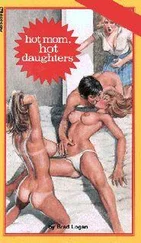Adam Levin - Hot Pink
Здесь есть возможность читать онлайн «Adam Levin - Hot Pink» весь текст электронной книги совершенно бесплатно (целиком полную версию без сокращений). В некоторых случаях можно слушать аудио, скачать через торрент в формате fb2 и присутствует краткое содержание. Год выпуска: 2012, Издательство: McSweeney's, Жанр: Современная проза, на английском языке. Описание произведения, (предисловие) а так же отзывы посетителей доступны на портале библиотеки ЛибКат.
- Название:Hot Pink
- Автор:
- Издательство:McSweeney's
- Жанр:
- Год:2012
- ISBN:нет данных
- Рейтинг книги:3 / 5. Голосов: 1
-
Избранное:Добавить в избранное
- Отзывы:
-
Ваша оценка:
- 60
- 1
- 2
- 3
- 4
- 5
Hot Pink: краткое содержание, описание и аннотация
Предлагаем к чтению аннотацию, описание, краткое содержание или предисловие (зависит от того, что написал сам автор книги «Hot Pink»). Если вы не нашли необходимую информацию о книге — напишите в комментариях, мы постараемся отыскать её.
was one of the most buzzed-about books of 2010, a sprawling universe of “death-defying sentences, manic wit, exciting provocations and simple human warmth” (
).
Now, in the stories of
, Levin delivers ten smaller worlds, shaken snow-globes of overweight romantics, legless prodigies, quixotic dollmakers, Chicagoland thugs, dirty old men, protective fathers, balloon-laden dumptrucks, and walls that ooze gels. Told with lust and affection, karate and tenderness, slapstickery, ferocity, and heart,
is the work of a major talent in his sharpest form.
*
comes in three resplendent colors (pink, gray and blue).
Hot Pink — читать онлайн бесплатно полную книгу (весь текст) целиком
Ниже представлен текст книги, разбитый по страницам. Система сохранения места последней прочитанной страницы, позволяет с удобством читать онлайн бесплатно книгу «Hot Pink», без необходимости каждый раз заново искать на чём Вы остановились. Поставьте закладку, и сможете в любой момент перейти на страницу, на которой закончили чтение.
Интервал:
Закладка:
“Merf merf merf wait!” she said.
“What?” the man said.
His wife slid the door open. “I said that he’s watching his weight,” she said.
“His weight?”
“You know,” his wife said. “Because it’s bacon.”
“Because it’s bacon?”
“The Food and Drug Administration doesn’t even classify it as meat. That’s how fattening it is. That’s why he doesn’t want to eat the bacon, I was saying. Because he’s watching his weight and bacon is so fattening that it’s classified by the USDA as a fat, even though it’s meat.”
“The FDA,” the man said, “or the USDA?”
“What?”
“First you said one and—”
“What I meant was—”
“Either way,” said the man, “is it really true?”
“What?”
“That bacon is classified not as a meat, as we would likely expect, but as a fat,” the man said.
“Well, it’s certainly something I’ve heard,” his wife said.
“But have you seen documentation? I mean, is it documented?”
“You know, I don’t know. I was trying to make a joke.”
“A joke?”
“About the dog watching his weight.”
“I don’t think that’s very funny,” the man said.
“I can tell,” said his wife.
“I didn’t find it funny when you originally said it, and I don’t find it funny now, after it’s been explained to me.”
“Jeez.”
“Jeez yourself,” the man said, and flung the strip of bacon toward the fence out of pique. The dog brought it back, dropped it on the patio, sniffed it, licked it, chewed it up and swallowed.
“Good dog ,” he told the dog. He turned to his wife. Her mouth was just a line. She’d been stung; he’d stung her. “I’m sorry,” he told her. “I’m sorry I snapped at you.”
She said, “Why are you feeding him bacon, anyway?”
“I wanted to give him a special treat.”
“You should have cooked it,” she said.
“I don’t think he cares if it’s cooked,” the man said.
“Uncooked bacon may contain harmful bacteria.”
“I doubt there’s any harmful bacteria — bacon’s cured. And the stomachs of dogs can handle more bacteria than the stomachs of people can.”
“Where do you get that ?” she said. “Have you seen documentation?”
“Touché,” said the man.
“That’s right,” said his wife. “They die from chocolate.”
They stared at each other until his wife smiled.
“Maybe…” she said. “Maybe it’s his blood pressure.”
“What?” the man said.
“The reason he didn’t want the bacon before. Because bacon’s very salty. Eating too much salt is a cause of high blood pressure.”
“Huh-ha!” the man said. “Now that is a good one.”
But he didn’t mean it. He did not think it was a good one, or even an okay one. What he thought was: I have just fed what may be poison to my beloved dog for no better a reason than to discover whether what I just fed my beloved dog is poison. I may have just set in motion the slow murder of my beloved dog and, in the process of doing so, I lied to my wife and made her feel bad about herself for having made a joke that I didn’t find funny. I am a terrible person. I do not want to have fed what may be poison to my dog, nor to have lied to my wife, nor to have made her feel bad about herself. I do not want to be a terrible person. I do not want to suffer the terrible justice that I want to believe is visited on terrible people. I need to get out of here and think .
“I’m going to the store,” the man said to his wife. “Do you need anything?”
“Eggs and veined cheese,” she said. “For veined cheese omelettes.”
“You’ve got it!” said the man. Then he turned to the dog. “Store, boy?” he said. “You want to go to the store?” The dog started to rise, as if it wanted to dance, but before it got tall enough to reach the man’s nipples, it fell back on all fours, dipped its head weirdly, then shifted its weight right to left, as if dizzy.
“So cute!” said the woman. “What’s he doing? So cute!”
Every night before bed, ever since he’d married his wife, and no matter how tired he was, the man brushed his teeth, rinsed with mouthwash, and flossed. Though he rarely enjoyed performing these tasks, afterward his mouth always tasted clean, and he felt responsible, forward-thinking, and generally adultlike. His uncompromising dental hygiene was good for his wife (kissing in the future as well as kissing today), good for himself (foregoing mouth-pain/dentures), good for his unborn child (forming good habits now to enable him later to more easily set a good example for the child about forming good habits), and good for America (lower dental costs meant lower-cost dental insurance which meant wider coverage). Preventive care, the man believed, was indeed a noble kind of care, maybe even the most noble kind.
Another, newer, thing the man regularly did (he’d been doing it for nearly six months, now) was to execute a two-point turn in the driveway and back into the garage every time he arrived home, the purpose of which was to obviate his need to back out of the garage (a task requiring a greater amount of focus and hand-eye coordination — and therefore a greater risk of accidental collision — than that of exiting the garage hood-first) to drive his wife to the hospital when she went into labor. For all the extra effort it took him (the two-point turn; the extra-slow, neck-straining ingress), his routine backing of the car into the garage was, no less so than the diligent, nightly cleaning of his mouth, a source of quiet pride for the man. Each time he thought of it, his spirits lifted.
And so they did (his spirits lifted) when he entered the garage with the dog to go to the store. At the sight of his in-backed, green Swedish car, the man was reminded that, in general, his intentions were good, and he began to feel a lot less terrible. He wasn’t a lazy or careless person. Quite the contrary. He was a two-point-turning nightly flosser, someone who was willing to do the harder thing to better ensure the safety and well-being of those he loved. And he remembered — or imagined he remembered (the distinction between memory and imagination being as thin a distinction as any, really) — that his reasons for feeding the dog the gel-smeared bacon weren’t nefarious reasons at all. It is true he’d been aware that the gel might be a poison, but he was no more aware of its potential toxicity than he was of its potential capacity to enhance the dog’s life. Was it so unlikely the gel was good for the dog? Might it not have been something healthy, like a vitamin supplement? Or maybe something that, healthy or not, could provide the dog some pleasure, such as that which, say, catnip did for cats? After all, he loved the dog, so even if, in the spirit of adventure and scientific discovery, he’d gotten a little bit carried away and fed it some gel that might be— might be —poisonous, he surely must have done so in the hopes that the dog would profit.
“You might still, yet,” the man said to the dog.
They were driving around now, the dog riding shotgun, facing the man, and happy-sounding chuffing sounds were chuffing from its nose.
“Profit, I mean,” the man said to the dog. “You might profit yet. I remember the first time I drank a beer. It tasted just awful, didn’t it, boy? Like a cross between an ashtray and an uncooked potato, but wet — still, I finished it off. I drank the whole can, didn’t I? Yep! I drank the whole can down in Billy Toomer’s basement, and by the last couple sips, I didn’t even mind the taste. I was really very happy, and so were all my friends. We were happy to have beer and happy to have drunk it. Moreover, we were happy to be happy, because all of us, at first, we all hated the taste, and we didn’t understand why men enjoyed beer, so all of us were worried we’d make shoddy men, or maybe even that we’d fail to ever become men, except then we understood — or at least thought we understood — why men enjoyed beer. It wasn’t the taste. Who cared about the taste? Beer made you happy, boy! Beer made you laugh! That’s right! Like that! Chuff chuff chuff! And we giggled like little girls did at church in the movies, and we drank second beers and talked about girls, mostly their chests, and how some of us had put our hands on their chests — not me, of course, this was only seventh grade, and I wouldn’t even kiss a girl till junior year of high school — and we talked about how girls — by ‘we’ I mean my friends — they talked about how girls seemed to really enjoy it, being groped on the chest. There were sounds the girls made. My friends reported gasping sounds, moaning sounds, quiet little chuffing sounds — yeah, just like that — and I remember thinking, even though I didn’t say it, that maybe those weren’t sounds of enjoyment, but pain. I’d seen people gasp, moan, and chuff from pain. I had, myself, made those sounds when in pain. And I wondered if, maybe, getting groped on the chest was, for girls, like drinking beer was for us. I wondered if maybe the sounds the girls made were pained sounds, like maybe they really didn’t enjoy being groped on the chest, or, more likely — more likely, I recall thinking, because the girls, at least according to what my friends said, kept putting up with the groping — more likely the girls learned to enjoy it and just forgot to change the sounds. And then — and this is the important part of what I’m trying to say, I think — then I wondered if I was full of shit. Just completely full of shit, you know, boy? Shit. I wondered if even though I seemed smart to myself and my parents, I was actually pretty dumb, plus completely full of shit. Do you see what I’m saying? I might have been making something out of nothing. That was the first really deep thought I ever had — or, at least, it’s the first one I can remember right now — and, just as I had it, I started feeling dizzy. All of us did. Our faces got long and our mouths were dry. Billy Toomer suggested we try drinking more — that the problem we were having, contrary to how it seemed, was that we hadn’t drunk enough. That we needed more beer to counteract our sick feelings. So we drank more beer, and man oh man did we get sick then! What I’m trying to tell you, though, is I’m sorry I’ve been acting so crazy lately — I’m sure you’ve noticed I haven’t been myself. What I’m hoping is that bacon I fed you will make you a happier dog, like the way the beer in Toomer’s basement, at least for a little while, made me a happier boy. I can’t, if I’m honest with myself, say that that’s what I was hoping all along — if I’m honest with myself, I don’t know what I was hoping — but I’d like to think, I mean I’d really like to think that that’s what I was hoping, and, more to the point, I am absolutely certain that’s what I’m hoping now. You’re someone I care about — you’re someone who, frankly, I love. And I trust you. I trust you to guard me while I sleep, and to guard my wife, and I trust that when he or she is born, knock wood knock wood, you’ll guard our child, too. I hope you won’t be jealous. We won’t love you any less. And you have my word that if you don’t show some signs of being a happier dog in the next little while, I will never feed you that gel again, and I can only hope, if that’s the case, that you’ll be able to forgive me. And I want you to know that I’m learning from this, it hasn’t been a waste, that what all of this has taught me, this whole experience with the crack and the gel — what I’ve learned from all of it is something I guess I’ve known, at least in part, ever since that day in Billy Toomer’s basement, something I’ve known all along but forgotten: that there are lots of things that can’t be known. Important things. And I’m saying I guess that’s the point of the journey. By the journey , I mean life. Life might actually have a point, I’m saying, and that point is that you just can’t know. Or maybe it’s less that there’s a point to the journey than that accepting that you just can’t know some things, especially the important ones — accepting that is the key to enjoying, or surviving , the journey. And what a liberating thought that is, boy, isn’t it? Do you see what I’m saying? As long as I’m accepting that I just can’t know , I might as well enjoy believing whatever I believe. This moment we’re having right now, for example. I’m talking to you, boy, I’m baring my soul to you, and even though you’re incapable of speaking any of the words I’m saying, let alone defining them, I nonetheless believe you understand what I’m saying. I believe you understand what underlies all these words. You understand that I’m here for you, boy, that I’m here to protect and take care of you, boy, and you understand I’m sorry I fed you that gel. I don’t have any evidence that you understand me — that’s true. But I don’t have any evidence that you don’t understand me, either. So why shouldn’t I believe it? That you understand me, I mean? I should believe it. That’s what I’m getting at. And what’s more, I do. I do believe it. And furthermore, boy, I enjoy believing it, and I should enjoy it! I do enjoy it, boy. And for that I am grateful. Thank you for understanding me, boy. Thank you for being such a — ooh! Shit. Oh no. No.”
Читать дальшеИнтервал:
Закладка:
Похожие книги на «Hot Pink»
Представляем Вашему вниманию похожие книги на «Hot Pink» списком для выбора. Мы отобрали схожую по названию и смыслу литературу в надежде предоставить читателям больше вариантов отыскать новые, интересные, ещё непрочитанные произведения.
Обсуждение, отзывы о книге «Hot Pink» и просто собственные мнения читателей. Оставьте ваши комментарии, напишите, что Вы думаете о произведении, его смысле или главных героях. Укажите что конкретно понравилось, а что нет, и почему Вы так считаете.











